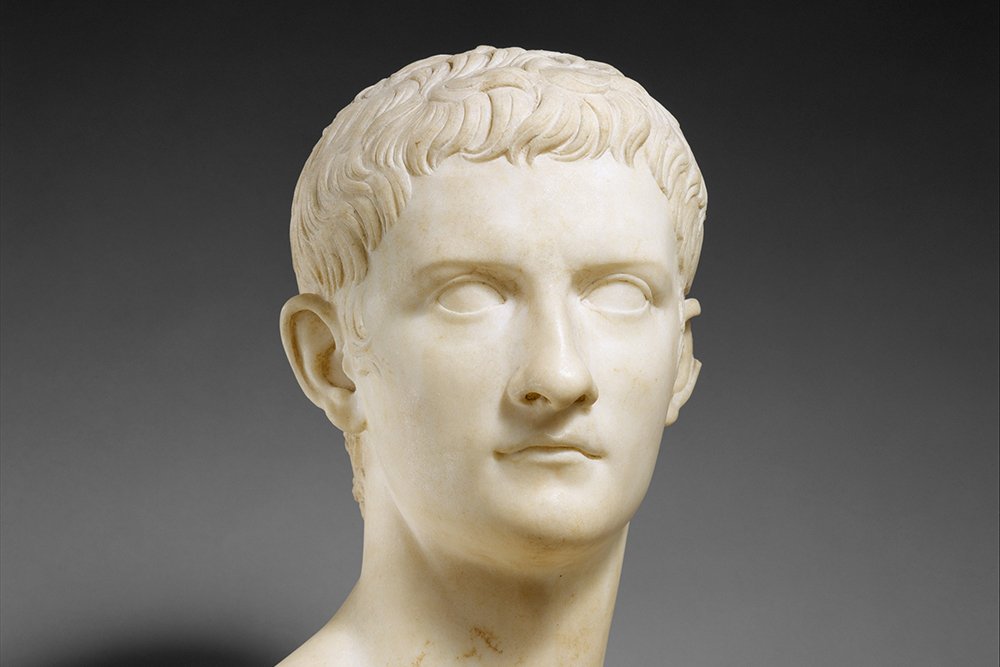
The emperor Caligula is a man usually associated with extravagance, insanity, cruelty and extreme sexual depravity. However, there are doubts as to whether the sources of the lurid stories that gave rise to this impression can really be relied on.
What is known for certain is that Caligula was born on 31st August 12 AD. His father was Germanicus, an extremely successful Roman general and one of the most popular public figures in Rome. Germanicus was the nephew of the emperor Tiberius, who had adopted him as his son.
Caligula's actual name was Gaius Julius Caesar Augustus Germanicus. 'Caligula', which means 'Little soldier's boot', was an affectionate nickname given to him by his father's troops while Gaius was accompanying his father during his military campaigns.
When Caligula's father died, his mother returned to Rome with her six children. An increasingly bitter feud with Tiberius led to her death and the death of all of her children except Caligula who was invited to join Tiberius on the island of Capri where he had retired to escape the lethal intrigues of Roman politics.
Caligula lived on Capri for six years, somehow managing to stay alive, and on the death of Tiberius in 37 AD, he became the third emperor of the the Roman Empire.
Caligula was an extremely popular emperor and was described as: "The first emperor who was admired by everyone in all the world, from the rising to the setting sun". It was reported that there were three months of public rejoicing during which time 160,000 animals were sacrificed.
The first part of his reign was described as "Blissful". He granted bonuses to the Praetorian Guard and the army, recalled those who had been sent into exile, abolished trials for treason, and staged lavish entertainment spectacles for the public. He introduced accountability in public spending, he reintroduced democratic elections and abolished certain taxes.
During his reign he undertook various construction projects including aquaducts, bridges and harbours. However, not all of these extravagant projects were for the common good. He also built lavish palaces for himself and two of the largest ships ever built in the ancient world. The smaller ship was used as a temple dedicated to Diana, and the larger one was a floating palace, complete with marble floors and plumbing. The remains of the ships were recovered from the bottom of lake Nemi during the dictatorship of Mussolini, but sadly they were destroyed by fire during the Second World War.
One of his projects was an extravagant but spectacular stunt. He ordered a floating bridge to be constructed using ships as pontoons. The bridge stretched for over two miles across the Bay of Baiae. Caligula, wearing the breastplate of Alexander the Great, rode his horse across the bridge. All of this to defy a prediction that had been made by Tiberius's soothsayer, Thrasyllus of Mendes, who had said that Caligula had "no more chance of becoming emperor than of riding a horse across the Bay of Baiae".
The latter part of Caligula's reign did not go so well. We was taken ill in 37 AD. Although he recovered, his personality seemed to have changed and he started killing off those he considered to be a threat. His extravagant spending led to a financial crisis which he attempted to avert by false accounting, creating new taxes and even executing people to seize their estates.
There are many famous stories about Caligula's decline. He wanted to make his horse a Roman Consul..
he threw members of the audience to the lions because he was bored during games...
he committed incest with his three younger sisters... he murdered for amusement.
Unfortunately, the people who reported these things were themselves victims of Caligula, so very few objective accounts survive.
In any event, his relationship with the Senate deteriorated rapidly, and when in 40 AD he announced that he was leaving Rome to live in Alexandria, where he hoped to be worshiped as a living god, his enemies decided to take action.